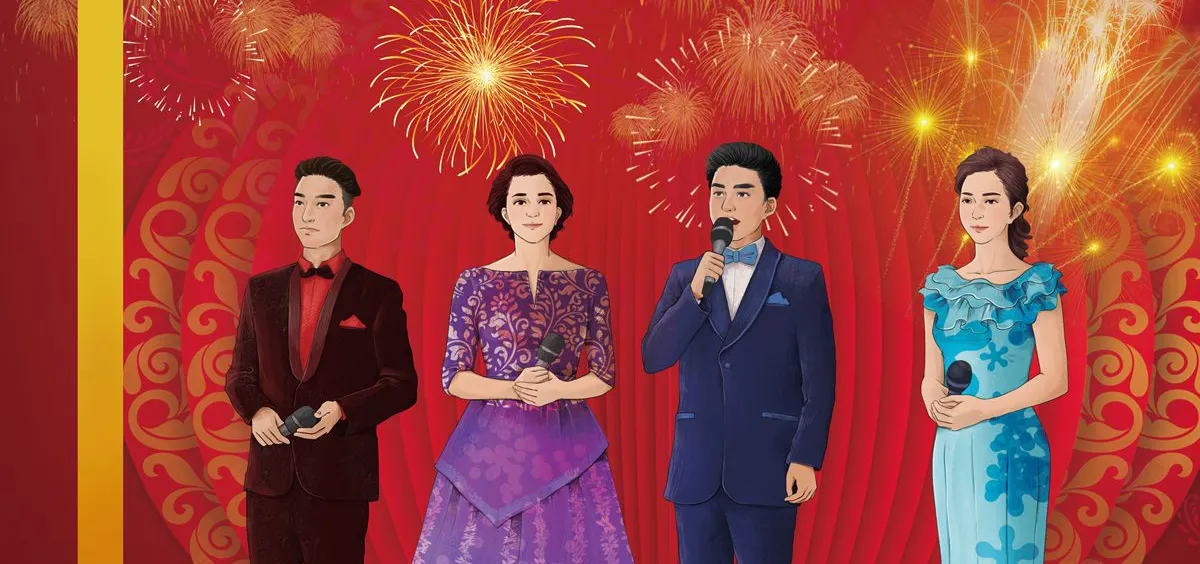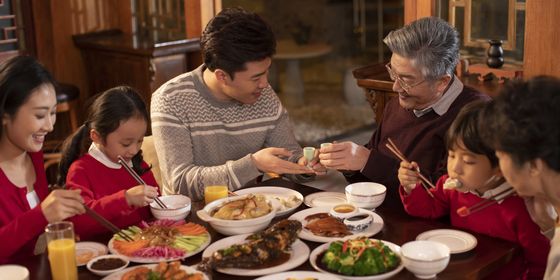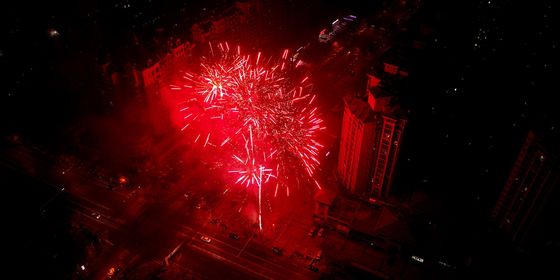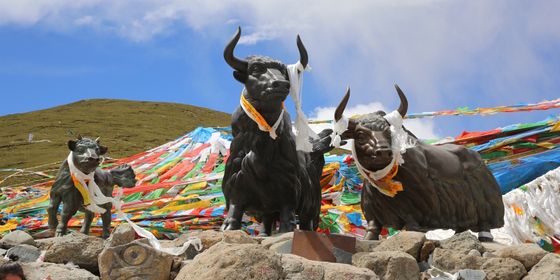How to decode CCTV’s Spring Festival Gala
At precisely 8 p.m. on Lunar New Year’s Eve in practically every Chinese household, the din of firecrackers and gossiping relatives will be interrupted by a different sound—an assemblage of red-clad TV announcers with overly chirpy voices, proclaiming that “spring has arrived.”
The CCTV Spring Festival Gala, or chunwan, is state media’s annual celebration of the Lunar New Year. When it premiered in 1983, the chunwan was the undisputed television event of the year, since most Chinese had no other chances to see different celebrities and entertainments share the same stage in a four-hour song, dance, and comedy extravaganza. Over the next quarter-century, though, as other amusements appeared, the show developed a reputation for being cheesy, formulaic, and a clunky mix of the political and sentimental.
Whatever one’s thoughts on the gala’s entertainment value—and those thoughts are always aired, passionately, on social media the morning after—its predictability has made the chunwan an immutable Spring Festival tradition. Just like the distinctive teleprompter air of CCTV News, the language and presentation style of chunwan hosts is a key element to the general feel of the show.
Anchors Away
There is perhaps no surer sign that a TV anchor has “made it” than being invited to host the CCTV chunwan. But with so many stars to highlight, recent editions have featured a bloated army of anchors, all itching to say the same stock phrases to over a billion audience members in China and abroad, necessitating some not-so-creative compromises:
Host A: China Central Television!
Zhōngguó Zhōngyāng Diànshìtái!
中国中央电视台!
Host B: China Central Television!
Zhōngguó Zhōngyāng Diànshìtái!
中国中央电视台!
Certainly, important messages should be repeated twice. Chunwan hosts’ way of delivering identical lines with seamless transition between each—all in the same plaintive voice, with matching pauses and intonation—creates a unique patter that’s recognizable to viewers around China, as is the following timeless greeting:
Host C: To all guests, and dear friends!
Gèwèi láibīn, qīn’ài de péngyǒumen!
各位来宾,亲爱的朋友们!
All: Happy Spring Festival!
Chūnjié hǎo!
春节好!
Nothing says “festivity” like a bunch of TV hosts shouting together. Announcer-choruses, though, are not just a feature of the intro, but the go-to method for both hosts and actors to introduce or wrap up any chunwan performance, emphasize certain messages, send well wishes, or simply increase that party atmosphere. Take 2015’s controversial “Happiness Street” skit starring actress Jia Ling—it may have insulted every unmarried “manly” woman in China in the span of 15 minutes, but the cast still wanted to leave the audience feeling warm:
Jia: Although I have no job or boyfriend, I have you guys…as long as friends stick together, then, in all the world, we’re—
Wǒ zhīdào, wǒ méi gōngzuò, yě méi duìxiàng, kěshì wǒ yǒu nǐmen……Zhǐyào péngyoumen zhàn zài yìqǐ, zánmen jiùshì tiān dǐxia——
我知道,我没工作,也没对象,可是我有你们……只要朋友们站在一起,咱们就是天底下——
All: The happiest!
Zuì xìngfú de!
最幸福的!
Spring Couplets
During Spring Festival, Chinese families traditionally decorate their doors with couplets—poems with two rhyming lines, corresponding in length and theme. Perhaps inspired by this tradition, the matching pairs of anchors in CCTV’s Spring Festival Gala often make use of repetition and parallels in their narration, as in this classic example from the 2008 Gala:
A: Fly toward spring—the spring tide surges and renews the world.
Fēi xiàng chūntiān, chūncháo péngpài tiāndì xīn.
飞向春天,春潮澎湃天地新。
B: Fly toward spring—the spring wind rushes and beautifies the scenery.
Fēi xiàng chūntiān, chūnfēng hàodàng shānhé měi.
飞向春天,春风浩荡山河美。
The festival is often likened to a handover from one Chinese zodiac animal to the next. Last year, as the Year of the Rooster gave way to the Year of the Dog, we heard couplets like:
The golden rooster crows goodbye to the old year; the auspicious dog steps across the snow to welcome the new spring!
Jīnjī bàoxiǎo cí jiùsuì, ruìquǎn tàxuě yíng xīnchūn!
金鸡报晓辞旧岁,瑞犬踏雪迎新春!
Look out for porcine terms this year, like:
Seeing off the jade dog, meeting the golden pig, we welcome another year to the sound of firecrackers!
Sòngbié yùquǎn, yínglái jīnzhū, bàozhú shēng zhōng wǒmen yòu jiāng yínglái zhǎnxīn de yì nián!
送别玉犬,迎来金猪,爆竹声中我们又将迎来崭新的一年!
All-embracing Greetings
The most important task for the chunwan hosts is to send New Year greetings. In order to ensure national unity and harmony, they must make sure that the wishes reach all the different ethnicities and classes, every profession, and every Chinese living elsewhere in the world:
A: At the turn of the year, we send greetings to people of all ethnic groups, to our compatriots from Hong Kong and Macau Special Administrative Regions, to our compatriots in Taiwan and overseas Chinese, and to all Chinese across the world.
Zài zhè cíjiù yíngxīn zhījì, wǒmen xiàng quánguó gèzú rénmín, xiàng Xiānggǎng Tèbié Xíngzhèngqū hé Àomén Xíngzhèngqū de tóngbāo, xiàng Táiwān tóngbāo hé hǎiwài qiáobāo, xiàng quán shìjiè de Zhōnghuá érnǚ bàinián!
在这辞旧迎新之际,我们向全国各族人民,向香港特别行政区和澳门特别行政区的同胞,向台湾同胞和海外侨胞,向全世界的中华儿女拜年!
B: We wish a happy New Year to all the soldiers of the People’s Liberation Army, the armed police forces, to the policemen, and everyone still working at this time!
Wǒmen xiàng Zhōngguó Rénmín Jiěfàngjūn quántǐ zhǐzhànyuán, xiàng wǔjǐng bùduì guānbīng, gōng’ān mínjǐng yǐjí suǒyǒu cǐshí cǐkè yīrán jiānshǒu zài gōngzuò gǎngwèi shang de rénmen shuō yì shēng “Guònián hǎo”!
我们向中国人民解放军全体指战员, 向武警部队官兵,公安民警以及所有此时此刻依然坚守在工作岗位上的人们说一声 “过年好”!
C: We want to say “Happy New Year” to all the workers, farmers, teachers, doctors, and people in every profession! Wish you the best of luck in your job next year!
Wǒmen xiàng suǒyǒu de gōngrén, nóngmín, jiàoshī, yīshēng yǐjí gèháng gèyè de péngyoumen bàinián! Zhù nǐmen xīn de yì nián gōngzuò shùnlì!
我们向所有的工人、农民、教师、医生以及各行各业的朋友们拜年!祝你们新的一年工作顺利!
Achievement Reporting
The New Year is also a chance for the government to report on the previous year’s activities and make forecasts for the future. Given that it’s a festive occasion—and one of the biggest media events of the year—we predictably only hear the good news:
Over the past year, significant headway has been made in reform and opening up; breakthroughs have been made in important fields and key links.
Guòqù de yì nián, gǎigé kāifàng màichū chóngdà bùfá, zhòngyào lǐngyù hé guānjiàn huánjié de gǎigé qǔdé túpòxìng jìnzhǎn.
过去的一年,改革开放迈出重大步伐,重要领域和关键环节的改革取得突破性进展。
Saved by the bell
Ringing the New Year bell is the reason most people stay awake through the interminable hours of kitschy graphics, stale skits, and random celebrity guest spots. For the emcees, though, it’s the hardest part, because they need to finish all their lines exactly before 12 a.m. strikes. The common strategy is to announce that it’s time to ring the bell, then trot out a few sentimental, essentially meaningless remarks that can be discarded once the countdown begins:
A: Friends, the New Year bell is about to ring.
Péngyoumen, xīnnián de zhōngshēng mǎshàng jiùyào qiāoxiǎng le.
朋友们,新年的钟声马上就要敲响了。
B: At this moment, let’s say goodbye to the old year with a grateful heart. Be grateful to our great era, to the beloved motherland, to our parents who raised us, to our friends who stand by our sides…
Cǐshí cǐkè, ràng wǒmen huáizhe gǎn’ēn de xīn yǔ jiùsuì gàobié, gǎn’ēn wěidà de shídài, gǎn’ēn qīn’ài de zǔguó, gǎn’ēn shēngyǎng wǒmen de fùmǔ, gǎn’ēn péibàn wǒmen de péngyǒu……
此时此刻,让我们怀着感恩的心与旧岁告别,感恩伟大的时代,感恩亲爱的祖国,感恩生养我们的父母,感恩陪伴我们的朋友……
C: Are you ready? Let’s count down together!
Nǐmen zhǔnbèi hǎo le ma? Ràng wǒmen yīqǐ dàoshǔ!
你们准备好了吗?让我们一起倒数!
All: Ten! Nine! Eight…
Shí! Jiǔ! Bā……
十!九!八……
“Unforgettable” Ending
No Spring Festival Gala is complete without the familiar melody of “Unforgettable Tonight.” Created for the 1984 chunwan, the song has closed the official gala so many times in the last 24 years. The hosts’ ending lines usually match the lyrics:
A: Tonight is unforgettable, as we collect memories and look back with deep feelings!
Nánwàng jīnxiāo, jīnxiāo wǒmen liúzhù jìyì, shēnqíng huíwàng!
难忘今宵,今宵我们留住记忆,深情回望!
B: Tonight is unforgettable, when we long for the future and prepare to set sail again!
Nánwàng jīnxiāo, jīnxiāo wǒmen mǎnhuái chōngjǐng, zàidù qǐháng!
难忘今宵,今宵我们满怀憧憬,再度起航!
C: Thanks to all for your company tonight!
Gǎnxiè dàjiā jīnyè de péibàn!
感谢大家今夜的陪伴!
ALL: See you next year!
Míngnián zàihuì!
明年再会!
Gala Palaver is a story from our issue, “Home Bound.” To read the entire issue, become a subscriber and receive the full magazine.












